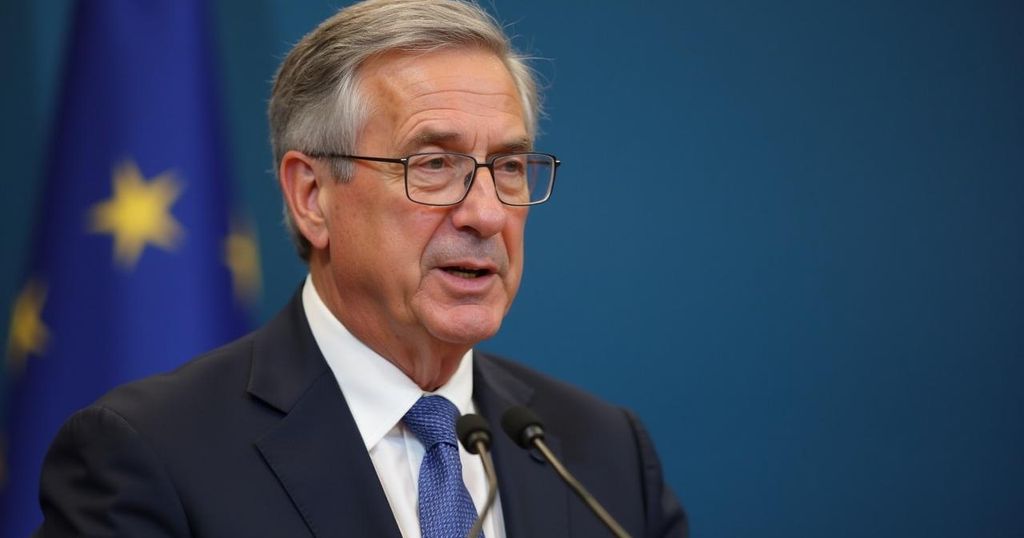A Greek official has criticized the European Commission for failing to create an effective migration policy that includes deportation mechanisms, highlighting that ongoing wars and climate change are exacerbating global displacement. The current EU migration pact lacks essential components for addressing returns, and Greece remains a critical entry point for migrants. The situation is worsening as more individuals flee conflict-ridden areas, while some EU nations are adopting stricter asylum measures. Immediate responses to these challenges are necessary as the crisis continues.
On Tuesday, Greek Deputy Minister for Migration Sofia Voultepsi sharply criticized the European Commission for its inability to implement a cohesive policy regarding the deportation of migrants. During a conference held near Athens, she underscored the insufficiency of the recent EU migration pact, stating, “We got the (agreement), but the basic piece is still missing: Returns.” Voultepsi stressed the necessity for a unified approach to asylum, returns, and integration in light of the increasing global displacement driven by conflict and climate change. Voultepsi expressed particular concern for the escalating number of refugees in Lebanon, exacerbated by ongoing Israeli airstrikes against Hezbollah, and highlighted how countries such as Somalia, Ethiopia, and South Sudan are simultaneously affected by warfare and the adverse effects of climate change, which contributes to a continuous influx of migrants towards Europe. Greece, serving as a significant entry point for migrants into the European Union, continues to see individuals arriving primarily from Turkey and Libya, often under perilous conditions. On the same day, the Greek coast guard reported the successful rescue of 81 migrants from a vessel in distress while en route from Turkey to Italy. These individuals, having reportedly paid $8,500 each for the journey, were brought to the southern port of Kalamata, where four of their companions were apprehended on smuggling charges. In parallel developments across Europe, an Italian navy ship has been anticipated to dock in Albania with 16 migrants who were intercepted at sea. Their asylum requests will be processed in Albania in accordance with a recent five-year agreement between Italy and Albania. Additionally, in Poland, Prime Minister Donald Tusk is contemplating a temporary suspension of the asylum right, which would necessitate parliamentary approval before enactment.
The current discourse surrounding migration policies in Europe has become increasingly urgent due to ongoing crises stemming from armed conflicts, particularly in the Middle East and African regions, along with the pressing realities of climate change. These factors are significantly contributing to rising numbers of displaced individuals seeking refuge in Europe. The European Union has been attempting to devise a comprehensive migration pact intended to manage the flow of migrants and enhance cooperation among member states. However, implementation has faced obstacles, particularly in the area of return policies—essential for alleviating the strain on border nations such as Greece. Given Greece’s geographical position, it has emerged as a pivotal entry point for many migrants, resulting in challenges related to both humanitarian support and migration management. In light of these ongoing crises, responses from EU nations vary, with some countries negotiating bilateral agreements to manage asylum processes and others proposing more restrictive measures. These divergent approaches reflect the complex nature of migration politics within the EU.
In summary, the criticisms posed by Deputy Minister Sofia Voultepsi regarding the EU’s handling of migration underscore the inadequacies in current policies, particularly concerning the lack of an effective return framework. The dual pressures of armed conflict and climate change are expected to perpetuate high levels of migration towards Europe, thereby necessitating more comprehensive and unified policy responses among member states. As migration trends continue to evolve, the European Union faces significant challenges in balancing humanitarian responsibilities with national policy measures.
Original Source: apnews.com






